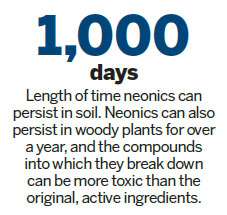Pesticides threaten birds and bees alike, report says
Updated: 2014-06-26 07:13
By Agence France-Presse in Paris (China Daily)
|
|||||||||||
Neurotoxic pesticides blamed for the world's bee collapse are also harming butterflies, worms, fish and birds, said a scientific review that called on Tuesday for tighter regulation to curb their use.
Analyzing two decades of reports on the topic, an international panel of 29 scientists found there was "clear evidence of harm" from use of two pesticide types, neonicotinoids and fipronil.
And the evidence was "sufficient to trigger regulatory action".
"We are witnessing a threat to the productivity of our natural and farmed environment," said Jean-Marc Bonmatin of France's National Center for Scientific Research, co-author of the report titled the Worldwide Integrated Assessment.
Far from protecting food production, these nerve-targeting insecticides known as neonics were "imperiling the pollinators, habitat engineers and natural pest controllers at the heart of a functioning ecosystem".
The four-year assessment was carried out by The Task Force on Systemic Pesticides, which advises the International Union for Conservation of Nature, the world's watchdog on species loss.
Neonics are widely used insecticides whose effects can be instant and lethal, or chronic. Exposure can impair smell and memory in some species, curb procreation, reduce foraging, cause flight difficulties and increase disease susceptibility.
Used for insect pest management in farming, but also in pet flea control, they have been fingered in the recent decline in bees - crucial pollinators of human food crops - in Europe, the Americas and Asia.
The latest study says these pesticides, absorbed by plants, are also harming other insect pollinators, fish and birds as they leach into soil and water.

The most affected species were terrestrial invertebrates such as earthworms, which are crucial soil-enrichers, said a press statement.
Bees and butterflies were next, followed by aquatic invertebrates like freshwater snails and water fleas, then birds, and finally fish, amphibians and certain microbes.
"The combination of their wide-scale use and inherent properties has resulted in widespread contamination of agricultural soils, freshwater resources, wetlands, non-target vegetation, estuarine and coastal marine systems," the authors wrote.
"This means that many organisms inhabiting these habitats are being repeatedly and chronically exposed to effective concentrations of these insecticides."
Neonics can persist in soil for more than 1,000 days, and in woody plants for over a year, and the compounds into which they break down can be more toxic than the original, active ingredients.
The authors suggested that regulatory agencies consider "to further tighten regulations on neonicotinoids and fipronil, and consider formulating plans for a substantial reduction of the global scale of use".
Related Stories
Use of banned pesticides illegal 2013-07-10 10:19
EU to ban pesticides blamed for harming bees 2013-04-30 07:52
Pollutants, pesticides threaten farm land 2012-06-12 17:32
Excess pesticides found in produce: Greenpeace 2012-05-18 08:17
130 Cambodian workers faint after inhaling pesticides 2011-10-25 13:44
Pesticides bring a silent spring 2011-10-19 14:03
Today's Top News
Over 1,000 Chinese unable to flee Iraq
'Suarez corkscrews' hit China
Sanctions on Russia may be delayed
Pesticides threaten birds and bees alike, report says
Beijing increases pay for educated army recruits
Putin in Austria discusses gas pipeline
China a World Cup winner? What a bunch of Brazuca!
Nation frets over middle class exodus
Hot Topics
Lunar probe , China growth forecasts, Emission rules get tougher, China seen through 'colored lens', International board,
Editor's Picks

|

|

|

|

|

|





